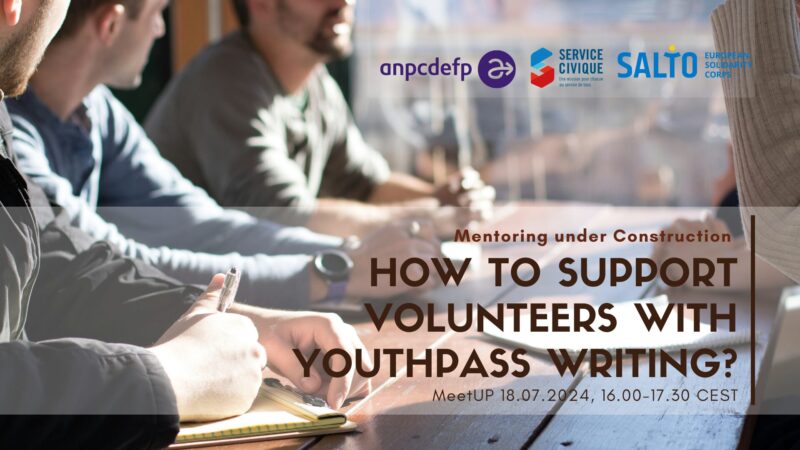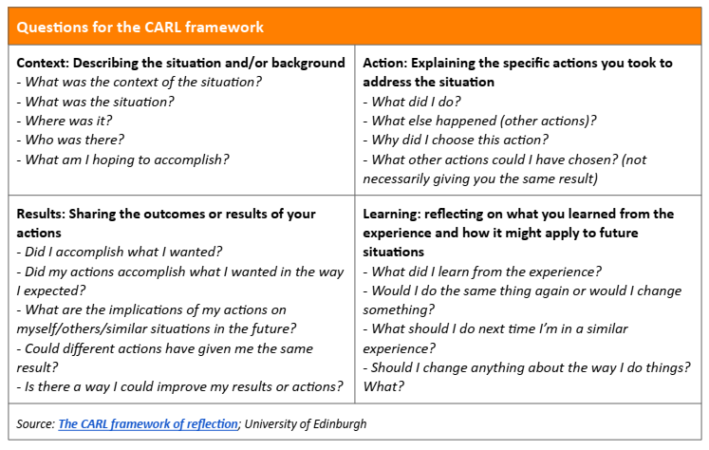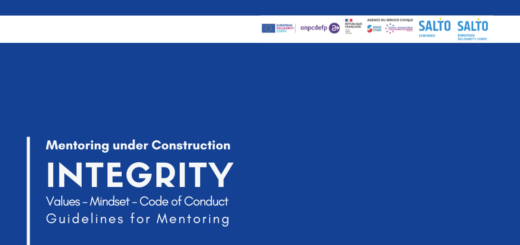How to support volunteers with Youthpass writing? | Mentoring under Construction

The content of this blog post has been created in the context of Mentoring under Construction. Mentoring under Construction is a community for mentoring practitioners within the European Solidarity Corps programme. Previous Content on Facilitating Learning and Development: How to support the learning process of a volunteer and Growing with GROW: Guiding the learning journey with the GROW model.
Youthpass is a tool that helps volunteers to identify and document their learning outcomes they make during their voluntary service. Youthpass promotes awareness and individual reflection about learning. It makes learning outcomes visible for the volunteers as well as for others and therefore supports the recognition of non-formal learning experience. (Youthpass Website)
Many volunteers use Youthpass to reflect on their experience, identify learning outcomes and write about the competence they have developed during their volunteering journey. Putting one’s own learning outcomes into writing and find the right words to formulate knowledge, skills and attitudes is often a huge challenge. It’s about becoming familiar with assessing your own learning process and outcomes as well as getting familiar with the language of competences.
However, if volunteers go through the this process and put in the work, they can make a difference in job interviews, because they talk about their volunteering experience in a different way, giving valuable insights about the knowledge and skills developed during their service. In this way, Youthpass can help building a bridge between the voluntary service and the future career. If we take this even one step further and examine the practice of job interviews, we can see, that the various frameworks used in interviews can help us with Youthpass writing.
Competency-Based Job Interviews
Today, job interviews not only explore the previous experience of the candidate, but focus much on the skills and behaviours relevant to the job profile. To do this, organisations and companies use so called competency-based interview techniques.
“A competency-based interview is an interview in which questions are used to determine how you handled tasks, challenges and other aspects of your previous or current job. Interviewers will use competency-based questions to inquire about specific examples in which you demonstrated various skills and behaviors in your career.” Indeed Editorial Team, 2023
Competency-based job interviews (also known as behavioural interviews), are designed to clarify if the skills and behaviours of a candidate match with the job profile they are applying for. Competency-based interviews focus on how candidates managed different tasks and scenarios at their current and previous jobs. In that way, an employer is able to identify those competences and qualities necessary that fit necessary job profile, assuming that the competences that are shown in those situations are the best predictor of future performance.
For our field it is important to notice, that the activities carried out and experiences made during the voluntary service are only a starting point for conversation in a job interview. From there an interviewer would be explore how volunteers handled certain situations, e.g. how they organised their work, how they developed team-cooperation, how they managed difficult situations, etc.
Frameworks for competency-based interviews
There are a lot of frameworks that help you to prepare for such conversations and we believe that they can be also helpful for Youthpass writing.
MuC MeetUP #7/2024 Youthpass writing
Check out the different frameworks here!
With these frameworks you may go through various situations of your voluntary journey and create a narrative around them. You find many behavioural questions for competency-based interviews online to get some examples. Here is a choice of scenarios we also use during our Mid-Term Meetings:
- Give me an example of a time you had a conflict with a team member. How did you handle it?
- Describe an occasion when you failed at a task. What did you learn from it?
- Tell me about a time you took the initiative in your career. What was your motivation for doing so?
- Describe a time when you used your leadership skills to motivate your team or colleagues. How did you do this?
- Describe a time when you were responsible for a task you didn’t receive training on and were unsure how to complete. How did you handle it?
- Give an example of a time when you had to make a difficult decision. How did you handle it?
- Describe your process for solving problems. What steps do you take to resolve important issues at work?
Reflective Practice
“Reflective practice is understood as the process of learning through and from experience towards gaining new insights of self and/or practice.” Linda Finlay, 2008
Reflective practice is about learning through and from experience in order to become more self-aware, gain new insights, challenge assumptions of everyday practice. Reflective practice is important for personal and professional development as essential for Life-long learning. There are various models of reflective practice, for example the experiental learning cyle (Kolb). Each of these models suggest a process to support reflection on and learning from experience. From this perspective, the frameworks used in competency-based interviews can be used to reflect on and learn from your volunteering experience.
The STAR framework
The STAR (Situation, Task, Action, Result) framework is probably the most widely recognized and used interview technique. It is structured, easy to remember, and provides a comprehensive approach to answering competency questions.
The STAR framework helps you to structure your responses in the following way:
- Situation: The situation sets the scene for your story. It involves providing enough context so that the interviewer understands the background. Describe briefly the setting or circumstances (who, what, where, and when).
- Task: Explain your role/task in that situation to show what you were responsible for. Focus on what you were supposed to accomplish or what challenge you needed to overcome.
- Action: This is the core of your response. Here, you discuss the specific actions you took to address the task or challenge. Highlight your personal contributions and the steps you took to achieve the desired result (what you did, how you did it, and why you chose those actions). Be sure to point out any challenges or obstacles encountered and how you navigated them.
- Result: Finally, outline the outcomes of your actions, including what was achieved and/or learned to show the impact of what you did. Emphasize positive results. If the results were not entirely positive, highlight what you learned.
Example: Promotion adaptation for an animal shelter
I worked as a volunteer at an animal shelter. I observed that the shelter had many animals waiting to be adopted, but due to the lack of promotion and community involvement, the animals spent a long time at the shelter (Situation).
I was responsible for creating and implementing a promotional campaign to increase the number of adoptions and raise community awareness about the importance of pet adoption (Task).
To address this problem, I took the following actions: I created promotional materials such as posters and flyers that showcased the animals available for adoption and the benefits of adopting pets. I contacted local newspapers, radio stations, and TV channels to promote the shelter and the adoption campaign. I launched a Social Media Compaign on Facebook and on Instagram account for the shelter, where I posted daily photos and stories about the animals available for adoption. And I organized events at various locations in the community, where people could meet the animals and learn more about the adoption process. (Action)
As a result of these actions, the number of adoptions increased significantly in the first two months of the campaign. The shelter’s social media pages attracted hundreds of new followers and generated increased community interest. The adoption events became very popular, and the feedback was extremely positive. (Result)
The CARL Framework
A framework that is probably closer to our field of Non-formal Learning and International Youth Work is the CARL framework because it expands the STAR framework and adds a focus on learning. CARL stands for: context (the description of the situation and/or background), action (explaining the specific actions you took to address the situation), result (sharing the outcomes or results of your actions) and learning (reflecting on what you learned from the experience and how it might apply to future situations).
Like the STAR framework, the CARL framework originally emerged as a tool for job interviews. It was designed to help individuals clearly and concisely describe their past experiences, particularly focusing on their roles and contributions to specific situations and challenges. Breaking down experiences into these four components, volunteers can effectively communicate their skills and achievements. This approach not only supports the individual reflection but also improves the clarity and impact of responses in professional settings like job interviews.
The University of Edinburgh created a Reflectors’ Toolkit that comes with helpful questions for the CARL framework.

Activity: Applying the CARL framework
Let’s try out the CARL framework to explore a certain situation. You can do this alone, but it is best done with another person or in groups of three (an interviewer, an observer, and one „interview candidate”).
Instructions
- Pick a question from the list above
- Decide who is the interviewer, who is answering and who is observing
- Start the interview
- Give feedback
- Take turns (if there is still time) and start over…
Download the worksheet “Applying the CARL framework”
How to prepare for a competency-based interview
Here are 7 tips to keep in mind, if you want to prepare for a competency-based job interview:
- Understand the job requirements and the key competences: Review the job description and identify the main competencies of the job profile.
- Extend your language of competences: Find out how to describe best your knowledge, skills and attitudes.
- Review your past experiences: Think about your previous roles, projects and challenges and identify examples where you demonstrated the key competencies.
- Get familiar with the STAR or CARL framework: Structure your reflection using the STAR or CARL framework (or both) and practice using these frameworks.
- Practice answering common behavioural questions: Practice helps to improve your ability to deliver clear, well-structured answers during the actual interview. Whenever possible, include quantifiable results to demonstrate the impact of your actions.
- Prepare for follow-up questions: Be ready to build up and elaborate on your narration, e.g. discussing the challenges you faced, your thought process, or what you learned from the experience.
- Stay authentic and be yourself: While following one of the frameworks might let your answers appear stiff and artificial, constant practice will help you to find your own narration and voice. Make the framework yours!
Recommended Resources
Previous Content on Facilitating Learning (MuC BlogPosts)
How to support the learning process of a volunteer
Growing with GROW: Guiding the learning journey with the GROW model
Reflective Practice
Finlay, Linda (2008): Reflecting on ‘Reflective practice’. Practice-based Professional Learning Paper 52, The Open University
OpenLearn (wY): Reflective writing, reflective practice and discipline perspectives; OpenLearn by The Open University
Frameworks for Competence-based Interviews
Boogaard, Cat (2024): STAR Method: How to Use This Technique to Ace Your Next Job Interview; themuse.com
Indeed Editorial Team (2023): 13 Competency-Based Interview Questions and How To Prepare for the Interview; via indeed.com
NN (2018): The CARL framework of reflection; University of Edinburgh
Tracy Atkinson (2022): The CARL Framework of Reflection; StudentSuccessSpace
UN HR Portal (wY): UN training on competency-based interview; UN HR
More on Youthpass Writing
Youthpass Heart Corps Online Course

Mentoring under Construction. Join our Community
The Mentoring under Construction Community is open for everyone who is interested in raising the quality in mentoring within European Solidarity Corps programme (and beyond): mentors, project managers/organisers, coordinators of volunteers, facilitators of learning, authors and trainers, and members of National Agencies and SALTO Resource Centres.
Mentoring under Construction | SALTO
Mentoring under Construction Community | Facebook



